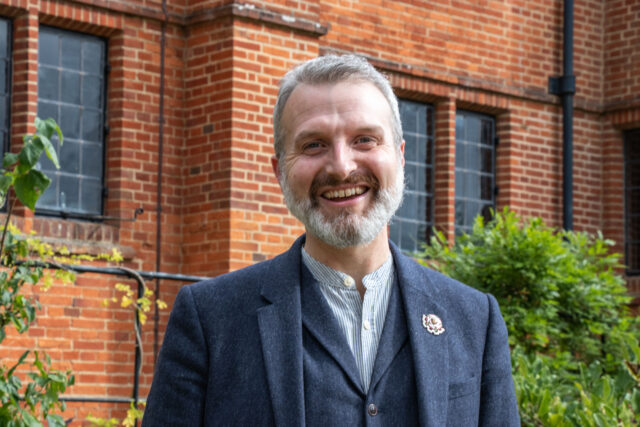Blog
HMC Reform of Assessment – Setting the Parameters Through Five Key Questions

Robin Macpherson
Head of College at Robert Gordon's College
Read the blog
In tackling both the future of assessment at GCSE, and the curriculum that assessment is based on, the HMC working group is looking at very broad areas. In order to frame this task effectively, there are five key questions that need to be addressed. Examples from three alternative systems are used to explore these questions, namely the English National Curriculum (ENC), the Scottish Curriculum for Excellence (CfE), and the International Baccalaureate (IB).
KQ1: What values should underpin the curriculum?
This question strikes at the heart of the matter: what is the purpose of education? Each system will have its own sense of purpose and ethos, but the ENC is the clear outlier of the three systems under consideration. The language that sets out the ‘aims’ (not ethos, or values) of the ENC is the same for both primary and secondary, and can best be described as functional. There are only two aims, and the first states that:
The national curriculum provides pupils with an introduction to the essential knowledge that they need to be educated citizens. It introduces pupils to the best that has been thought and said; and helps engender an appreciation of human creativity and achievement.
Definition of what is meant by “educated citizens” or criteria for “essential knowledge” is left hanging. The second aim presented is that the curriculum is a ‘core’ and there should be opportunities to go beyond it elsewhere in a child’s education. The merit of such an approach could, theoretically, be flexibility, but that is undermined by highly prescriptive content in subject domains.
This contrasts with the learner profile set out by the IBO in the Diploma Programme. The values statement here is far more idealistic, stating that:
The aim of all IB programmes is to develop internationally minded people who, recognizing their common humanity and shared guardianship of the planet, help to create a better and more peaceful world.
IB learners must ‘strive’ to be ten things: inquirers; knowledgeable; thinkers; communicators; principled; open-minded; caring; risk-takers; balanced; reflective. Critics of the system have typically accused it of cultural imperialism, being classically liberal-democratic in nature with its origins in 1960s Switzerland. However, there is a clear framework and rationale which is relatively easy for teachers – and learners – to articulate.
In Scotland, the Curriculum for Excellence (CfE) was introduced in 2010 after eight years of incubation and much international research. The influence that the OECD wields in Scottish education policy can scarcely be understated. In Scotland, education is not something a person has, but something they experience. In this regard, the curriculum is about experiences and outcomes (or ‘Es and Os’, as you will hear Scottish teachers parroting). The system is predicated on ‘four capacities’ that children are to become:
- Successful learners
- Confident individuals
- Responsible citizens
- Effective contributors
The values are based on the principles inscribed on the mace of the Scottish parliament, which are wisdom, justice, compassion and integrity (though there is a debate about the origin of these values). This statement reads:
The curriculum must be inclusive, be a stimulus for personal achievement and, through the broadening of experience of the world, be an encouragement towards informed and responsible citizenship.
Therefore the IBO and CfE point in the same direction, and go well beyond the ‘light-touch’ approach of the ENC. Which system offers the best approach? In a context when all schools are encouraged (or even expected) to clearly articulate their core values, should we not expect the same of a national curriculum? If so, what should those values be?
KQ2: What should children be learning?
The extent to which a curriculum should be prescriptive or not has huge implications. The ENC goes down the route of being far more prescriptive about what needs to be taught, and that is a clear source of frustration for many. With decolonising the curriculum firmly on the agenda post-George Floyd, it invites obvious criticism about fitness for purpose. It does, however, have the benefit of making life easier for teachers in terms of knowing what to teach.
In this regard, the IBO offers a curious dissonance in that the Middle Years Programme (MYP, for ages 11-16) provides an assessment framework, but the onus is on teachers to create the content. This gives immense freedom, but has an obvious consequence for workload – nothing is ‘off the shelf’. When the MYP gives way to the Diploma Programme (IBDP) the approach becomes much more like the ENC, with detailed content for subjects, but with the added advantage of incredible global breadth. Whether this breadth is genuinely accessed by schools is open to challenge.
In Scotland, the same dissonance can be seen. Up to age 15, pupils follow the Broad General Education (BGE) with a wide range of subjects. This gives way to the Senior Phase, with most pupils taking GCSE-equivalent exams at National 5, but only over one year and again with prescribed content and a depressingly narrow range in terms of internationalism. At Higher and Advanced Higher, the same pattern follows. So after a long period of ‘breadth’ there is a sudden sprint towards content-driven knowledge and high stakes assessment.
A key question that needs to be answered is whether there should be a ‘knowledge-rich’ curriculum, on the lines of E.D. Hirsch (one of the most misunderstood educational writers in terms of political debate on the ‘culture wars’). Agency for teachers and pupils alike seems highly desirable, but there is a paradox here. The more freedom that is given in curriculum design, the more it might be taken away by the crushing weight of workload.
A final issue is around interdisciplinary learning (IDL), which is frequently lauded as being a twenty-first century necessity and desirable over subject silos. Yet despite the rhetoric, hard evidence for true IDL is hard to find in the ENC, the IBDP, and CfE. If IDL can be done well, and is deemed to be desirable, how should the curriculum be structured to facilitate this?
KQ3: What kind of assessment is best for learning?
Dylan Wiliam’s work on Assessment for Learning is instructive here, because what was meant to be a transformative approach was boiled down, by policy makers, into levels and data. As Tom Sherrington has pointed out in an excellent blog, the five key principles of Formative Assessment are complex and can easily fall down:
To some extent I feel that the issue has been that ‘AfL’ or even ‘formative assessment’ has been too broad a term; too much of a catch-all, thereby allowing various degrees of corruption and dilution to take root. I think that it’s when you get into understanding and deploying the five separate strategies that it finds form. That’s the understanding of formative assessment that teachers need. It’s powerful stuff, right there, where it’s been for years.
Indeed, Wiliam once said that he wished he had called it ‘responsive teaching’, but then changed his stance. This Twitter thread from 2018 shows why, and also demonstrates the complexity around assessment practices.
This provides a backdrop to the burning issue of the pandemic: what is the future of high stakes assessment? Education had not harnessed the potential of technology to assess pupils sufficiently well before the pandemic began, leaving limited options when exams became impossible. The debacle over teacher estimated grades shows how badly all systems were caught out. Do we still value traditional exams, and high stakes assessment as a measurement of learning? Or should we be looking to shift the balance towards low stakes assessment, little and often over time, in a genuinely continuous assessment model? Which approach, in a post-pandemic world, would best facilitate learning whilst also proving sustainable in an uncertain world?
A final question, related to the curriculum debate, is about knowledge and skills. Too often they are framed as being antithetical, which is misleading, but even so what should assessment be taking aim at? Do we want to see a knowledge-rich curriculum with assessment driven by that knowledge? Or does the 21st century world demand more in the way of skills? If a balance is desired, how do we achieve, and weight, that?
KQ4: What pedagogy should support teaching and learning?
Pedagogy: the long-lost relative of curriculum and assessment. Once upon a time they were fellow travellers, but pedagogy somehow got lost and is probably still roaming in the wilderness. Yet what we teach is arguably less important than how we teach. To give a current example, Dr Marlon Moncrieffe has argued that the decolonising the curriculum is really about inclusive pedagogies; by focusing on new content rather than the way content is taught, we are heading down the less impactful route of curriculum diversity.
However, in England a fairly toxic debate has developed in recent years between ‘traditionalists’ and ‘progressives’. The former argue that direct, or explicit instruction is preferable because novices learn differently to experts. This argument is most clearly set out in a highly influential research paper by Kirschner, Sweller and Clark (2006). This position is frequently supported by the growing influence of cognitive psychology in education over the past decade. Progressives, or constructivists, believe that approaches based on collaborative and discovery learning are more pupil-centred and allow for creativity and independent thinking. This has an obvious appeal for schools that promote ‘child-centred learning’ and ‘pupil voice’.
Navigating this debate means trying to take the heat out of it, but much like values, it is essential. The nature of both curriculum and assessment is dependent on the pedagogy that provides their foundations. What, therefore, should that pedagogy look like?
KQ5: What education system can best support these aims?
If the first four questions have been answered and a consensus achieved (which is no mean feat) then the biggest question of all emerges: what system of governance is required to safeguard this brave new world? Both the ENC and CfE are, fundamentally, education systems run by politicians. This means that in a democratic election, the party in power has to justify its track record by showing that pupil outcomes have improved. Unsurprisingly, grade inflation in national exams has been a feature of both countries. This contrasts with the IB – a system that is not accountable to a national government – whose grades have not changed in the past quarter of a century. The IB also operates on a cycle of subject reviews in curriculum and assessment (in the DP this is every eight years), with evolution rather than revolution as a consequence.
There is little need to go over all the examples of education secretaries (without teaching credentials) interfering from on high with dire consequences for school leaders and teachers. One will suffice – Michael Gove’s aborted 2012 plan to scrap GCSEs with just two years’ lead time shows how devastating this can be. In Scotland, Prof Walter Humes has written extensively about political leadership in education and the culture of bureaucracy that so often shapes it (“the dead hand of officialdom”). Humes quotes the eminent social historian, TC Smout, who wrote this in 1986:
Perhaps . . . it is in the history of the school more than in any other aspect of recent social history that the key lies to some of the more depressing aspects of modern Scotland. If there are in this country too many people who fear what is new, believe the difficult to be impossible, draw back from responsibility, and afford established authority an exaggerated respect, we can reasonably look for an explanation in the institutions that moulded them.
This all seems very pessimistic about political structures, but any substantial reform that takes place must be lasting; it must have longevity. So, what political structure is required for an education system to have genuine integrity and sustainability?
Conclusion
Perhaps a positive outcome of the pandemic is that it has provided an opportunity to re-examine and introduce meaningful reform that can deliver a system of curriculum and assessment genuinely fit for the 21st century. Prior to 2020, the appetite for yet more change simply wasn’t there, but the context we now work in has changed so immeasurably that we now have a chance that may only ever come once this century. What teachers and pupils require is a system that delivers the education they need and want, and not only betters what has gone before but also lasts far into the future. Reforming GCSEs represents a great opportunity to initiate this, but one that is best seen as one of many dominoes carefully lined up.

